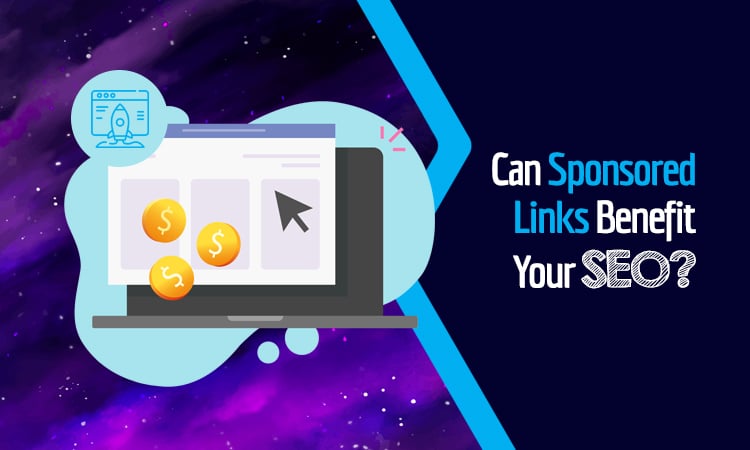Are you looking to boost your website’s visibility and attract qualified visitors and more traffic through search engine optimization? Sponsored links can play a significant role in your link-building strategy and impact your website’s SEO.
This comprehensive guide will explore the world of sponsored links, their effectiveness, best practices for incorporating them, and their influence on search engine rankings. Let’s dive in and discover the secrets to a successful link-building strategy that maximizes your website’s potential.
Understanding Sponsored Links
Sponsored links, also known as paid links, are a crucial component of search marketing strategies. These links are designed to appear on engine results pages (SERPs) and other web pages. They are marked with the tag rel=”sponsored” to distinguish them from organic search results.
These links are often associated with platforms like Google Ads and the Google Search Network. They play a significant role in influencing engine rankings, driving targeted traffic, and gaining exposure.
By leveraging link attributes and effectively managing them, websites can enhance their visibility in the results and increase their brand’s reach.
How Do Search Engines View Sponsored Links?
Search engines, like Google, have adapted their approach to sponsored links over time. In 2005, Google introduced the “nofollow” attribute to combat spam comments and user-generated content (UGC) associated with paid links. This attribute tells search crawlers not to follow or pass PageRank to the linked page, indicating that the link is sponsored or paid.
However, it’s important to distinguish between the two types of sponsored links. The first type refers to links that are marked with the “sponsored” tag, indicating their promotional nature. The second type comprises regular dofollow links that you pay for, without any explicit sponsored tag.
In 2019, Google introduced additional attributes to provide clarity. The “sponsored” attribute is used for explicitly paid links, while the “UGC” attribute is for user-generated content links. These attributes help engines understand the intent and purpose behind different types of links.
From a search engine’s perspective, sponsored links are recognized as paid advertisements or promotional content. They may appear on search engine result pages (SERPs) or other web pages, but are often labeled to differentiate them from organically received links.
Search engines strive to provide visitors with relevant and unbiased search results. By utilizing link attributes such as “nofollow,” “sponsored,” and “UGC,” engines can accurately interpret and handle sponsored links. This ensures the integrity of SERPs and delivers a fair and transparent search experience to users.
It’s worth noting that adding nofollow links doesn’t guarantee that a link won’t be followed, as some search engines may interpret the nofollow attribute differently.
The Role of Sponsored Links in SEO
Sponsored links, including those marked with the “sponsored” tag and paid-for dofollow links, can significantly enhance your website’s visibility and attract exemplary visitors. While understanding link attributes such as “nofollow links,” “sponsored,” and “UGC” is crucial for understanding their impact on rankings, it’s essential to differentiate between these two types of sponsored links.
Although sponsored links themselves don’t directly influence the ranking on the SERPs, they play a vital role in your overall link-building strategy. By strategically incorporating sponsored links into your content, you can attract relevant visitors and increase the likelihood of user clicks. Moreover, earning sponsored links from reputable websites can provide valuable exposure, particularly when targeting highly competitive keywords.
It’s worth noting that the distinction lies in the explicit “sponsored” tag for promotional links versus regular dofollow links that are paid for but don’t carry the sponsored tag.
Enhance Your Website’s Authority
One of the benefits of using sponsored links is the potential to earn backlinks through sponsored articles, forum posts, or user-generated content (UGC). These links can enhance your website’s authority and improve its overall quality score, positively impacting your search rankings.
Help Generate Your Brand’s Exposure
Moreover, sponsored links can help generate exposure, particularly when displayed on websites within the display network. They allow you to reach a wider audience and potentially attract visitors who have a higher customer lifetime value.
When using paid links, it’s essential to maintain a balance and adhere to best practices. Ensuring that the sponsored attribute is correctly implemented and that sponsored content is clearly labeled helps engines understand the nature of these links.
Attract Certified Visitors
Furthermore, focusing on attracting relevant visitors and leveraging sponsored links strategically can contribute to the success of your link-building efforts.
In conclusion, sponsored links may not directly affect SEO rankings, but they offer benefits for attracting visitors and enhancing exposure.
Understanding Sponsored Links in Practice
Sponsored links serve as a distinctive component on the SERPs, differentiating them from organic links. These links are often prominently displayed and labeled “sponsored” to indicate they are paid.
Understanding the characteristics and purpose of sponsored links is essential in leveraging their potential in SEO efforts.
Strategic Placement to Increase Traffic
On SERPs, sponsored links are strategically placed to capture users’ attention and promote relevant products or services. They are a form of paid advertisement facilitated through platforms like Google Ads and Google AdWords.
By investing in a sponsored link, companies aim to gain exposure, increase website traffic, and ultimately drive conversions.
Using sponsored links in SEO efforts has its pros and cons. On the positive side, a sponsored link can provide immediate visibility and attract targeted visitors who are actively searching for specific products or services related to the search query.
Allow Small Businesses to Compete With Giants
They can also improve a web page’s quality score and potentially drive high customer lifetime value. Additionally, advertising links allow small companies with limited organic reach to compete and gain exposure in highly competitive markets.
Keep the ROI in Mind
However, there are considerations to keep in mind. Sponsored links cost money, and a campaign’s effectiveness should be measured by its return on investment. Furthermore, search engines may apply the “nofollow” link attribute to them, limiting their impact on organic rankings.
It is essential to strike a balance between sponsored links and organic SEO strategies to ensure a comprehensive approach to website visibility and ranking purposes.
Firms can leverage their potential to drive targeted traffic, gain exposure, and achieve their marketing goals by effectively using these links and organic SEO techniques.
Factors to Consider When Using Sponsored Links
When using these links, it is crucial to consider factors that can determine whether your sponsored links work and the effectiveness and overall success of your marketing efforts. Some of these factors include consumer skepticism, cost implications, and the importance of creative assets.
Consumers Must Not Get Skeptical
One factor to be mindful of is consumer skepticism. Regular audiences may become skeptical or even feel alienated if they perceive the links as intrusive or deceptive. It is essential to maintain transparency and ensure that sponsored content provides genuine value to visitors, aligning with their interests and expectations.
Cost Implications
Cost implications are another key consideration. Sponsored links often involve expenses, such as ad spend on platforms like Google Ads or influencer collaborations.
It is essential to carefully plan and allocate budgets to maximize return on investment (ROI) and ensure that link costs align with the overall marketing strategy.
Creative assets play a significant role in the effectiveness of sponsored content. Engaging visuals, compelling ad copy, and relevant keywords are essential for capturing user attention and driving engagement.
Consider Your Brand Identity
Ensuring that your sponsored content aligns with your brand identity and resonates with your target audience is crucial for achieving desired results.
Relevance is Crucial
Other factors, such as the relevance of the sponsored content to the target audience, the performance of previous sponsored campaigns, and the credibility and reputation of websites or influencers promoting the links, should be considered.
Websites can optimize their use of these links by carefully considering these factors and implementing best practices. Balancing user experience, cost-effectiveness, and creative quality will help ensure that the links effectively contribute to your overall marketing strategy and drive the desired outcomes for your business.
Integrating Sponsored Links into a Comprehensive SEO Strategy
Integrating sponsored links into a comprehensive SEO strategy involves a holistic approach that combines various tactics to maximize the overall impact on rankings and website visibility. It is crucial to understand the importance of using them alongside traffic-building and high-quality backlinks.
While they can provide immediate visibility and targeted traffic, it is essential to recognize that organic traffic and building authority through high-quality backlinks have long-term significance. These organic efforts contribute to a website’s overall credibility and reputation, enhancing its visibility in search engine results.
Businesses can use them strategically to complement their organic SEO efforts and effectively target specific keywords, demographics, or niches.
Help Generate That Initial Exposure
Sponsored links can help generate initial exposure and attract visitors who may not have discovered the website through organic means alone. Furthermore, they provide trackable results and valuable data, enabling businesses to assess campaign success and make data-driven decisions for future optimization.
However, it is essential to consider various factors in the overall marketing strategy. While they can drive immediate traffic, their effectiveness may be limited by factors such as ad spend, competition, and algorithmic changes. Therefore, businesses, especially small ones, should balance their use of these links with other tactics to ensure long-term success and sustainability.
Integrating them into a comprehensive SEO strategy can be a valuable component in driving targeted traffic and achieving specific marketing objectives. However, it should be complemented by organic traffic-building efforts and high-quality backlinks for long-term success.
How Can You Benefit From A Sponsored Link: The Takeaway
These links play a vital role in SEO strategies, offering several benefits for companies aiming to improve their online visibility and attract targeted traffic. You can effectively leverage them to enhance your presence on search engine results pages (SERPs) and drive exemplary visitors to your website.
It is essential to understand that the links are just one piece of the puzzle. To maximize the benefits, a comprehensive approach that combines various link-building tactics is necessary. Integrating links with organic SEO, high-quality backlinks, and compelling content can yield more significant, long-lasting results.
Some key takeaways include carefully selecting the right websites, blogs, or platforms to place your links, and monitoring and optimizing their performance to ensure a positive return on investment.
Remember, a single sponsored link may not bring immediate success, but when used strategically as part of a broader strategy, it can contribute to your overall business goals.
When used effectively alongside outreach link-building services and a holistic SEO plan, they can generate valuable traffic, increase brand exposure, improve search engine rankings, and drive business growth.













